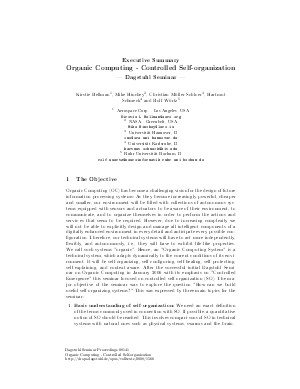08141 Executive Summary – Organic Computing - Controlled Self-organization
Authors Kirstie Bellman, Mike Hinchey, Christian Müller-Schloer, Hartmut Schmeck, Rolf Würtz
-
Part of:
Volume:
Dagstuhl Seminar Proceedings, Volume 8141
Part of: Series: Dagstuhl Seminar Proceedings (DagSemProc) - License:
 Creative Commons Attribution 4.0 International license
Creative Commons Attribution 4.0 International license
- Publication Date: 2008-07-23
File

PDF
DagSemProc.08141.2.pdf
- Filesize: 107 kB
- 4 pages
Document Identifiers
Subject Classification
Keywords
- Organic Computing
Metrics
- Access Statistics
-
Total Accesses (updated on a weekly basis)
0PDF Downloads0Metadata Views
Abstract
Organic Computing (OC) has become a challenging vision for the design of future information processing systems: As they become increasingly powerful, cheaper and smaller, our environment will be filled with collections of autonomous systems equipped with sensors and actuators to be aware of their environment, to communicate, and to organize themselves in order to perform the actions and servic-es that seem to be required. However, due to increasing complexity we will not be able to explicitly design and manage all intelligent components of a digitally enhanced environment in every detail and anticipate every possible configuration. Therefore, our technical systems will have to act more independently, flexibly, and autonomously, i.e., they will have to exhibit life-like properties. We call such systems "organic". Hence, an "Organic Computing System" is a technical system, which adapts dynamically to the current conditions of its environment. It will be self-organizing, self-configuring, self-healing, self-protecting, self-explaining, and context-aware.
Cite As Get BibTex
Kirstie Bellman, Mike Hinchey, Christian Müller-Schloer, Hartmut Schmeck, and Rolf Würtz. 08141 Executive Summary – Organic Computing - Controlled Self-organization. In Organic Computing - Controlled Self-organization. Dagstuhl Seminar Proceedings, Volume 8141, pp. 1-4, Schloss Dagstuhl – Leibniz-Zentrum für Informatik (2008)
https://doi.org/10.4230/DagSemProc.08141.2
BibTex
@InProceedings{bellman_et_al:DagSemProc.08141.2,
author = {Bellman, Kirstie and Hinchey, Mike and M\"{u}ller-Schloer, Christian and Schmeck, Hartmut and W\"{u}rtz, Rolf},
title = {{08141 Executive Summary – Organic Computing - Controlled Self-organization}},
booktitle = {Organic Computing - Controlled Self-organization},
pages = {1--4},
series = {Dagstuhl Seminar Proceedings (DagSemProc)},
ISSN = {1862-4405},
year = {2008},
volume = {8141},
editor = {Kirstie Bellman and Michael G. Hinchey and Christian M\"{u}ller-Schloer and Hartmut Schmeck and Rolf W\"{u}rtz},
publisher = {Schloss Dagstuhl -- Leibniz-Zentrum f{\"u}r Informatik},
address = {Dagstuhl, Germany},
URL = {https://drops.dagstuhl.de/entities/document/10.4230/DagSemProc.08141.2},
URN = {urn:nbn:de:0030-drops-15660},
doi = {10.4230/DagSemProc.08141.2},
annote = {Keywords: Organic Computing}
}
